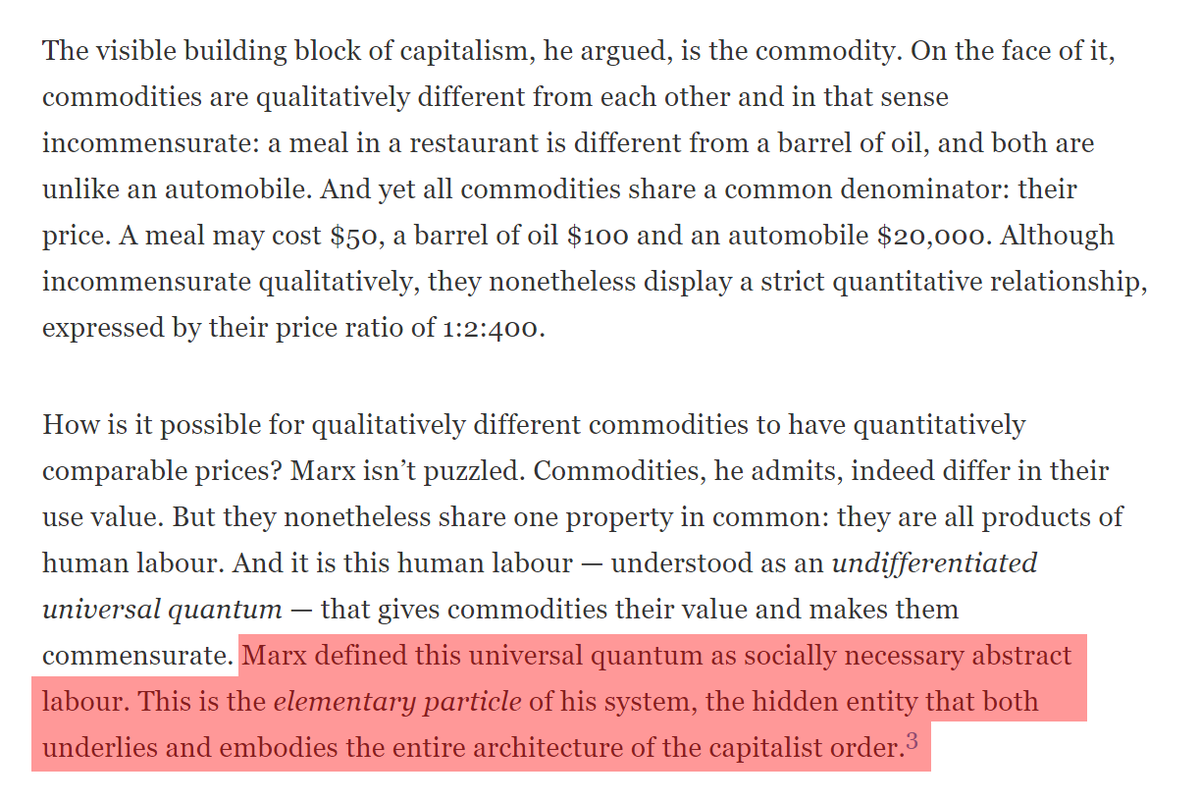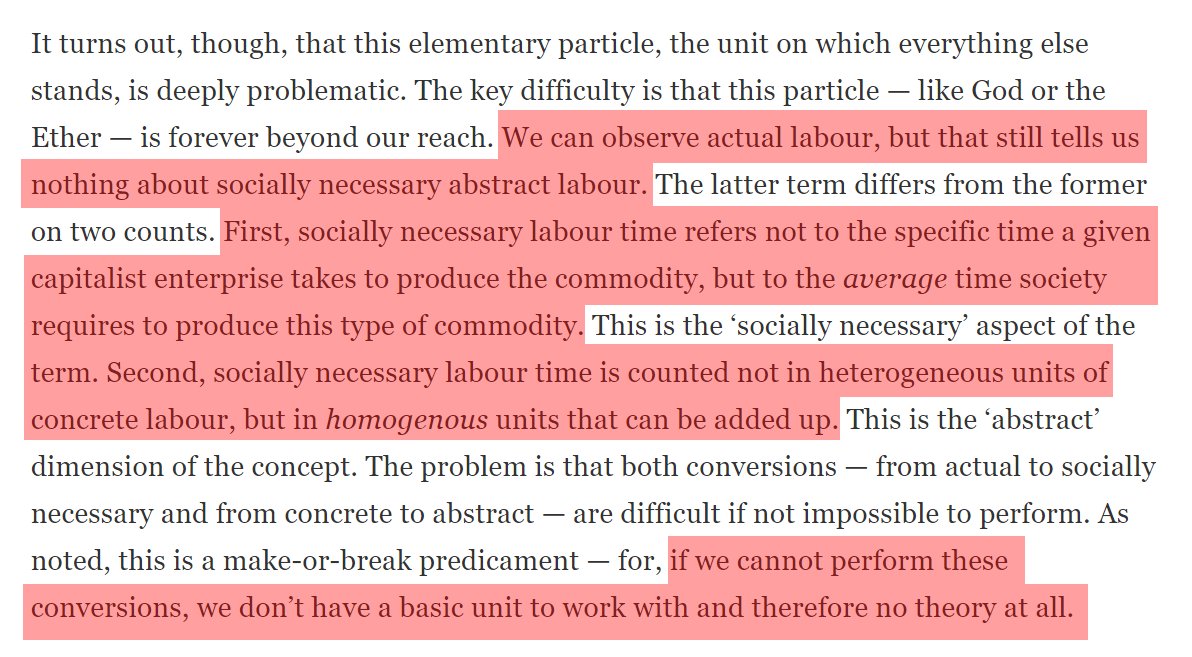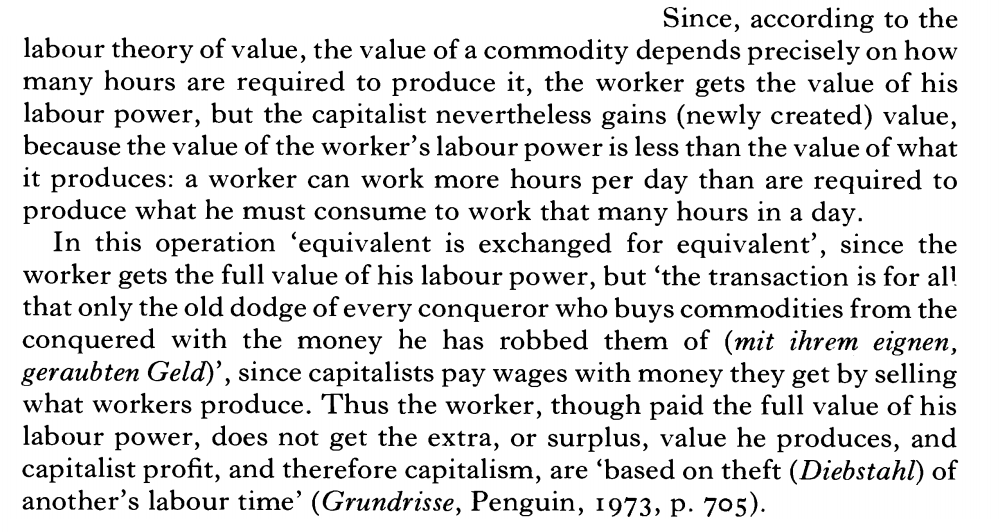
reposting as an OP: Nitzan and Bichler 2009 present a foundational problems with the Marxian labor theory of value:
the metric of labor (socially necessary (SN) abstract (A) labor-time (LT), or SNALT) cannot be directly observed; we can only observe actual, concrete labor-time:

the metric of labor (socially necessary (SN) abstract (A) labor-time (LT), or SNALT) cannot be directly observed; we can only observe actual, concrete labor-time:


The first conversion of "actual" to "socially necessary" is more feasible.
If competition forces most capitalists to produce efficiently (use no more labor-time than socially necessary), then average actual LT may be close to socially necessary LT.
Shaikh, Cockshott argue this.
If competition forces most capitalists to produce efficiently (use no more labor-time than socially necessary), then average actual LT may be close to socially necessary LT.
Shaikh, Cockshott argue this.
The second conversion of "concrete" to "abstract" is much less feasible.
Concrete labor, observable labor-- cutting a log, hammering a nail -- is heterogenous. It is done by different people, in different places, with different skills and education, in different ways, etc.
Concrete labor, observable labor-- cutting a log, hammering a nail -- is heterogenous. It is done by different people, in different places, with different skills and education, in different ways, etc.
In contrast, abstract labor must be homogenous because you have to be able to add it up. You can't add up "cutting a log" and "hammering a nail" because they have different units. Instead, they must have a common unit.
This runs into a simple problem: It is obvious that different labor adds different amounts of value. But it is not obvious how much value different labor adds.
One cannot simply look at an object before and after production and see how much value was added.
One cannot simply look at an object before and after production and see how much value was added.
In empirical work, Marxians generally resolve this by asserting that the average value added by concrete labor-time (which we cannot observe) is proportional to the average wage rate of that concrete labor-time (which we can).
This does allow conversion of concrete labor to abstract labor: We can add wages.
But this approach is circular: We would only assume that competition forces capitalists to pay wages proportional to value added by labor if the LTV is correct.
But this approach is circular: We would only assume that competition forces capitalists to pay wages proportional to value added by labor if the LTV is correct.
To avoid this circularity, other Marxians simply use the raw # of labor-hours. (Either directly measured, as in Sweden, or dividing total wages by average wages.)
Again, this allows conversion from concrete to abstract.
And again, this is the approach of Shaikh, Cockshott.
Again, this allows conversion from concrete to abstract.
And again, this is the approach of Shaikh, Cockshott.
But this removes us twice from directly measuring value-as-SNALT:
- We assume average concrete labor-hours equals (or is proportional to) socially necessary abstract labor-hours
- We assume all labor-hours create equal value (or, equal on average for each unit under comparison)
- We assume average concrete labor-hours equals (or is proportional to) socially necessary abstract labor-hours
- We assume all labor-hours create equal value (or, equal on average for each unit under comparison)
We might better call this the "equal-hour market-average concrete labor-time (EH MA C LT) theory of value" than the "skilled-multiple socially-necessary abstract labor-time" (SM SN A LT) that Marx seemed to support.
In short: B&N correctly suggest that we cannot directly measure SNALT. Instead, Marxians must proxy SM-SN-A-LT with EH-MA-C-LT.
(B&N provide two more critiques about observing productive vs unproductive labor and about transforming values to production prices to market prices.)
(B&N provide two more critiques about observing productive vs unproductive labor and about transforming values to production prices to market prices.)
• • •
Missing some Tweet in this thread? You can try to
force a refresh



















